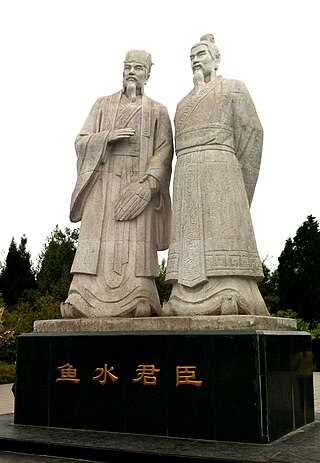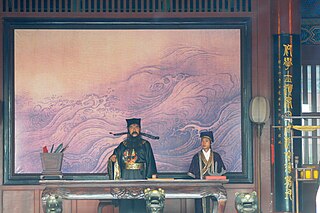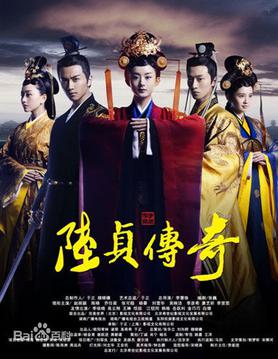
Qin Shi Huang was the founder of the Qin dynasty and the first emperor of China. Rather than maintain the title of "king" borne by the previous Shang and Zhou rulers, he assumed the invented title of "emperor", which would see continuous use by monarchs in China for the next two millennia.

Jing Ke was a youxia during the late Warring States period of Ancient China. As a retainer of Crown Prince Dan of the Yan state, he was infamous for his failed assassination attempt on King Zheng of the Qin state, who later became Qin Shi Huang, the Qin Dynasty's first emperor. His story is told in the chapter titled Biographies of Assassins (刺客列傳) in Sima Qian's Records of the Grand Historian.

The Chu–Han Contention (楚漢相爭), also known as the Chu–Han War (楚漢戰爭), was an interregnum period in Imperial China between the fall of the Qin dynasty and the establishment of the Western Han dynasty. After the third and last Qin ruler, Ziying, unconditionally surrendered to rebel forces in 206 BCE, the former Qin Empire was divided by rebel leader Xiang Yu into the Eighteen Kingdoms, which were ruled by various rebel leaders and surrendered Qin generals. A civil war soon broke out, most prominently between two major contending powers – Xiang Yu's Western Chu and Liu Bang's Han. Some of the other kingdoms also waged war among themselves but these were largely insignificant compared to the main conflict between Chu and Han. The war ended in 202 BCE with a Han victory at the Battle of Gaixia, during which Xiang Yu committed suicide after making a last stand. Liu Bang subsequently proclaimed himself emperor and established the Western Han dynasty.

Bao Zheng, commonly known as Bao Gong, was a Chinese politician during the reign of Emperor Renzong in China's Song Dynasty. During his twenty-five years in civil service, Bao was known for his honesty and uprightness, with actions such as impeaching an uncle of Emperor Renzong's favourite concubine and punishing powerful families. His appointment from 1057 to 1058 as the prefect of Song's capital Kaifeng, where he initiated a number of changes to better hear the grievances of the people, made him a legendary figure. During his years in office, he gained the honorific title Justice Bao due to his ability to defend peasants and commoners against corruption or injustice. Bao Zheng is depicted as the incarnation of the Astral God of Civil Arts, while another protagonist — famous Northern Song warrior Di Qing as the Astral God of Military Arts.

The grand chancellor, also translated as counselor-in-chief, chancellor, chief councillor, chief minister, imperial chancellor, lieutenant chancellor and prime minister, was the highest-ranking executive official in the imperial Chinese government. The term was known by many different names throughout Chinese history, and the exact extent of the powers associated with the position fluctuated greatly, even during a particular dynasty.

Inside The Forbidden City is a 1965 Hong Kong Huangmei opera musical film. Depicted is the famous tale known as "Civet for Crown Prince" which allegedly took place in China's Song Dynasty.
Murong Sheng, courtesy name Daoyun (道運), also known by his posthumous name as the Emperor Zhaowu of Later Yan (後燕昭武帝), was an emperor of the Xianbei-led Later Yan dynasty of China. He was the oldest son of Murong Bao, and after Murong Bao was killed by Lan Han avenged his father in a coup and took the throne. During his final years, he demoted himself from Emperor and used the unique title of "Commoner Heavenly King" (庶人天王).

Romance of the Three Kingdoms is a Chinese television series adapted from the classical 14th century novel of the same title by Luo Guanzhong. The series was produced by China Central Television (CCTV) and was first aired on the network in 1994. It spanned a total of 84 episodes, each approximately 45 minutes long. One of the most expensive television series produced at the time, the project cost 170 million yuan. It was completed over four years and involved over 400,000 cast and crew members, including divisions of the People's Liberation Army from the Beijing, Nanjing and Chengdu military regions. Some of the dialogue spoken by characters was adapted directly from the novel. Extensive battle scenes, such as the battles of Guandu, Red Cliffs and Xiaoting, were also live-acted.

The Legend of Qin, also Qin's Moon, is a CG Chinese animated wuxia TV series produced by Robin Shen (沈乐平), and directed by Chen Qianyuan (陈乾元). The story is based on novel of the same name by Taiwanese writer and entrepreneur Sayling Wen. It is China's first 3D animation, produced by Sparkly Key Animation Studio in Hangzhou, Zhejiang. The series was first broadcast around Chinese New Year in 2007.

Judge Bao stories in literature and performing arts are some of the most popular in traditional Chinese crime fiction. All stories involve the Song dynasty minister Bao Zheng who solves, judges and sentences criminal cases.

The Tale of Loyal Heroes and Righteous Gallants (忠烈俠義傳), also known by its 1883 reprint title The Three Heroes and Five Gallants (三俠五義), is an 1879 Chinese novel based on storyteller Shi Yukun's oral performances. The novel was later revised by philologist Yu Yue and republished in 1889 under the title The Seven Heroes and Five Gallants (七俠五義), with the story essentially unaltered.
Qin Zongquan was a Chinese military general, monarch, politician, rebel, and warlord during the Tang dynasty. He was later a claimant to the imperial throne, in competition with Emperor Xizong of Tang and, later, Emperor Xizong's brother Emperor Zhaozong, with his capital at Cai Prefecture. At Qin's prime, he controlled most of modern Henan and parts of modern Hubei, Anhui, and Jiangsu, but he was eventually repeatedly defeated by the Tang general and warlord Zhu Quanzhong. His subordinates turned against him and delivered him to the Tang capital Chang'an, where he was executed.

Gong'an or crime-case fiction is a subgenre of Chinese crime fiction involving government magistrates who solve criminal cases. Gong'an fiction first appeared in the colloquial stories of Song dynasty. Gong'an fiction was then developed and become one of the most popular fiction styles in Ming and Qing dynasties. The Judge Dee and Judge Bao stories are the best known examples of the genre.

Sound of the Desert is a 2014 Chinese television series based on the historical romance novel Ballad of the Desert by Tong Hua. It stars Liu Shishi, Eddie Peng and Hu Ge. The series aired on Hunan TV from 1 October to 27 November 2014.
King Xi of Han, personal name Han Jiu (韓咎), was a ruler of the Han state, reigning from 295 BC until his death in 273 BC. He was a son of King Xiang.

Legend of Lu Zhen is a 2013 Chinese television series based on the novel Female Prime Minister (女相) by Zhang Wei. Directed by Li Huizhu, Zheng Wei'en and Liang Guoguan and produced by Yu Zheng and Mu Xiaohui, the series stars Zhao Liying and Chen Xiao. It was first broadcast on 5 May 2013 in China and subsequently aired in other Asian countries such as South Korea and Japan.

The Legend of Mi Yue (Chinese: 羋月傳; pinyin: Mǐ Yuè Zhuàn; Wade–Giles: Mi3 Yüeh4 Chuan4) is a 2015 Chinese television series directed by Zheng Xiaolong and based on Jiang Shengnan's eponymous historical novel. It stars Sun Li in the title role of Mi Yue. The series aired 2 episodes daily on Beijing TV and Dragon TV from 30 November 2015 to 9 January 2016.

The King's Woman is a 2017 Chinese television series starring Dilraba Dilmurat and Vin Zhang. It is adapted from the novel The Legend of Qin: Li Ji Story (秦时明月之丽姬传). The series aired on Zhejiang TV every Monday to Wednesday, from 14 August to 4 October 2017.
Dongfang Shuo is a 2008 Chinese historical and biographical television series centered on Dongfang Shuo, a Han dynasty scholar-official, fangshi, author, and court jester to Emperor Wu. It is based on the novel Wisdom Holy Dongfang Shuo by Dongfang Longyin. The series was jointly by China Central Television, Beijing Film Academy and Guangdong Donghexing Recording and Video Company. The series stars Cheng Qian as Dongfang Shuo, the rest of the main cast includes Jin Dong, Hu Ke, Qin Hailu, Yu Xiaowei, Liu Xiyuan, Hu Yajie, Tao Huimin, and Zhang Lingxin. It originally aired on CCTV-8 in August 2008.

















